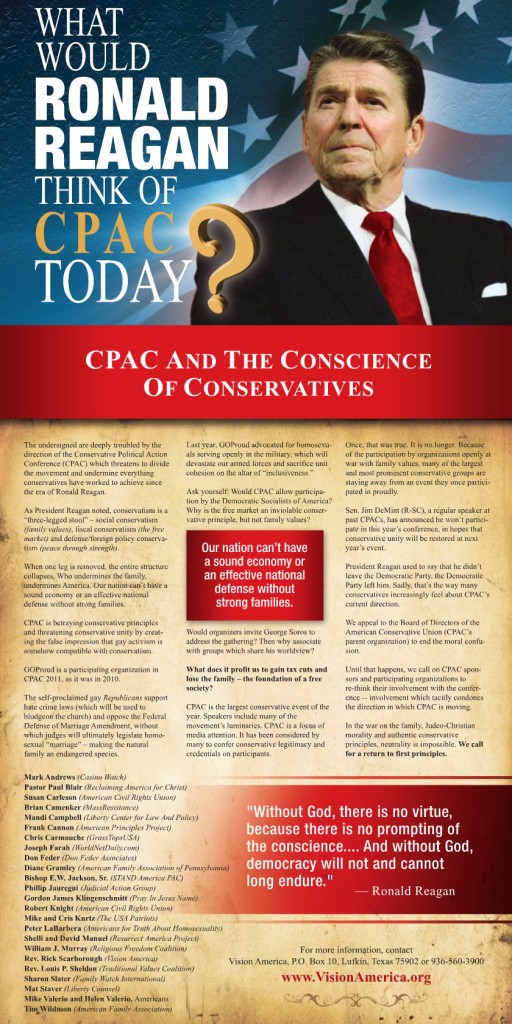Reading today’s Politico made me doubt that Reagan would make the cut in 2012.
Indeed, by the end of the weekend, a dozen potential presidential hopefuls will have auditioned for the role of activist hero at CPAC, which is organized by Cardenas’s group.
So far, though, every leading contender seems to have a potentially fatal flaw.
Mitt Romney has a reputation for flip-flopping, which he acquired during the 2008 campaign and for his record on health care as governor of Massachusetts. Meanwhile, there are doubts about former Minnesota Gov. Tim Pawlenty’s readiness for the national arena. And while Pawlenty remains a cipher to most Republicans, former House Speaker Newt Gingrich is entirely too well-known.
Indiana Gov. Mitch Daniels, meanwhile, alienated the GOP’s social conservative wing by calling for a “truce” on cultural issues. And Mississippi Gov. Haley Barbour is an admitted creature of the Washington establishment who has called ideological purity a “dead-dog loser.”
In the wake of the Republican Party’s sweeping victory in 2010, conservatives have less patience than ever for that message. They’re hoping for a nominee who’s a “full conservative,” said Family Research Council President Tony Perkins — someone who can completely satisfy the economic, social and foreign policy wings, all at the same time.
By “full conservative” Perkins means someone who is sufficiently anti-gay. The Family Research Council pulled out of the CPAC convention, going on now, because a conservative gay group, GOProud, was allowed to take part.
Now consider that former CA Governor Ronald Reagan publicly opposed the 1978 Briggs Initiative which would have allowed school districts to fire and refuse to hire gays teachers and those straight teachers who spoke favorably about homosexuals. The measure failed and Reagan was given some credit for the defeat by gay groups. He had nothing to gain politically and a lot to lose in that he was gearing up for a run at the White House – which of course he won.
What if Reagan approached the GOP race today opposing discrimination against gays as a point in his resume? Can you imagine how he would be treated by the social conservative camp? I suspect the social conservative establishment would see it as a disqualification.
Three cases in point; for several years former MN Governor, Tim Pawlenty, has been distancing himself from a gay rights employment measure he supported in 1992. Some social conservatives will not forgive Mitt Romney for his stance on gay issues when he was MA’s chief executive. And Mitch Daniels is a non-starter for some social conservatives because he has called for a truce on social issues.
Clearly, the bar is high. Out of reach, in my view because the country is moving toward a more moderate position on gay issues, while tilting right on matters that get people elected to Congress. Conceivably, Reagan would play about right in today’s electoral environment but he might be rejected by the current crop of social conservative advocates. Back to Politico:
Calling the 112th Congress the “most conservative” in memory, Perkins argued that there’s now a tougher standard for self-described conservative candidates: “Folks are going to be looking for what we just saw elected to Congress.”
Club for Growth President Chris Chocola, whose group is vetting presidential candidates based on their records on economic issues, agreed that the 2012 crowd has a “higher hurdle to clear.”
“There’s a heightened level of scrutiny that began during the 2010 cycle that’s carrying over into 2012,” he said. “There’s not an obvious choice right now that would be energized by our membership — not to say they couldn’t get energized.”
I submit that Reagan’s role opposing the Briggs Initiative would place him in similar company as Mitt Romney or Mitch Daniels today. With that in mind, I applaud CPAC for keeping the conservative tent a Reagan-friendly one. Now what will the GOP do?
